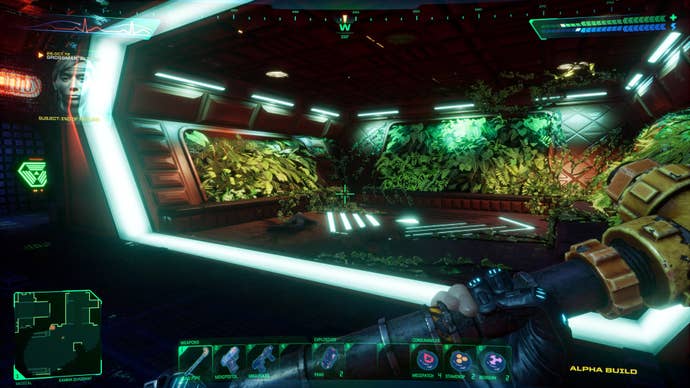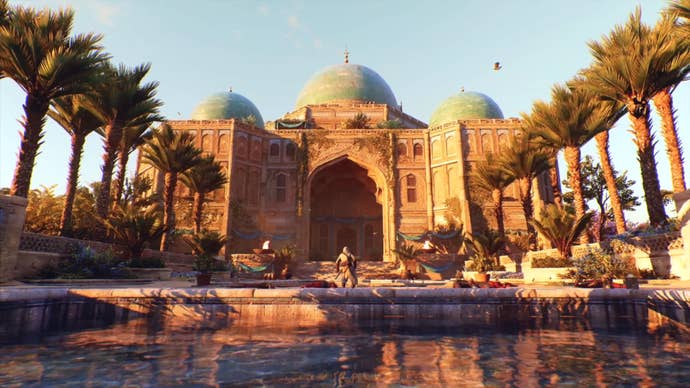[ad_1]
There was a time when rumors abounded that the next Assassin’s Creed: Mirage it would lead directly to (or be packaged with) a complete remake of the original game. It’s easy to see how this idea caught on: Mirage was sold to us early on as a sort of basic reboot for the series that harkens back to the city-based gameplay of the original game and is set in the same “world region.”
So it may seem like a no-brainer. The assets made to recreate 9th century Baghdad could surely be reused in a facsimile of 12th century Damascus. It makes sense, if you’re not obsessed with the fact that the two places are as far apart in space and time as modern Paris and, er, Cromwellian Liverpool. In any case, the Ubisoft employees seemed eager to pour cold water in that perspective last year. Maybe the project was shelved. Or, perhaps, Assassin’s Creed: Mirage is a remake in itself that finds a separate, more explicit project unnecessary.
The thing about video game remakes, is that they’re great for newcomers, but they’re not necessarily that interesting for longtime fans. Take the recent PS5 remake of The Last of Us, for example. It offered a fresh, modern interpretation of the original story and was in a good position to introduce new audiences, some to the TV show, some too young to have entered it ten years ago, into the fandom of the most controversial of the world. world. -until death 7/10.
But for those of us who have been there in the past, it offers little more than a chance to retread old ground. Ground that has been positively trodden into a slushy sludge between the original, the remaster, and the TV series that draws much of its beats directly from it. And it’s not the only video game remake to offer a pristine carbon copy of an existing story told with more polygons and shaders: this is a phenomenon that has graced everything from second-tier schlock like Destroy All Humans to critical darlings like MGS3. : Snake Eater and System Crash. Remakes that are substantial, but don’t dare alter the substance itself (even in cases where there’s little to go around).

It strikes me, then, that as an early Assassin’s Creed fan, Mirage is the best proposition: a quasi-remake that will remind me of the game I fell in love with all those years ago, which is similar in style. it looks and feels, and rehabilitates its classic systems and mechanics for modern sensibilities, but which moves the story forward and frees itself from having to repeat less appealing elements.
Although it has enjoyed something of a reappraisal of the Prequel Trilogy style of late, the fact remains that at AC1’s release it was considered something of a disappointment. The repetitive investigative tasks made me feel tired after the third mission, and this was not helped by the fact that almost every system felt like hell, from the parkour “why is he just kicking the wall? ” to the extremely annoying tracking and theft. that was either too easy or maddeningly impossible, depending on your Xbox’s mood at the time. It could be argued that many of these were skill issues, but the mid-2000s TV drama’s gloomy, overexposed color palette and well-documented pacing issues (“Another modern scene? Really?”) They certainly were not.

For the record, I adore the original game, and I think it deserves its place alongside the greats of the franchise, like its direct sequel, everyone’s favorite pirate sim Black Flag, or the unquestionably beautiful Origins. Each AC has its own quirks and weaknesses that make it unique, and AC1’s shortcomings are an integral part of its identity. They certainly don’t stop it from being a beloved classic.
But they do not necessarily have to be repeated. And with Mirage, Ubisoft has released itself from any obligation to do so. Instead, it looks like it’s going to be a vibrant celebration of the entire series thus far: the thunderous return of the city-based gameplay of yesteryear, with dense crowds to push through and skybox-drilling towers to pounce on. A return to the wondrous Middle East, which remains the series’ most fascinating playground: from the bustle of Ottoman Constantinople, through the majesty of Ptolemaic Egypt, to the war-weary stoicism of Syria and the Kingdom of Jerusalem. during the Crusades. And yet it is a direct derivative of the most recent game in the series, with all the benefits of the endless improvements and trial-and-error evolutions that have occurred along the way.

So it’s up in the air if Ubisoft will give fans a remake of the original Marmite. It would be stupid of us to dismiss it entirely, but given what’s been said, it doesn’t appear to be actively being worked on at the moment. However, Mirage is something much more exciting than that: the bright and heady spirit of the original game in an earthy new vessel. One with a beautiful, rich color palette, the incredible architecture of one of the world’s most lively cities ever, and an all-new story and characters to keep the series’ momentum moving in a forward direction.
If I had a binary choice between what Mirage offers or a painstakingly monotonous recreation of something I’ve already played, with better graphics (but not necessarily better art direction), I’d pick Mirage. Also, as my friends and Twitter followers are sick of me pointing out, you can play the first Assassin’s Creed in glorious 60fps on Series X/S consoles, and as I explain in the surreptitiously embedded video at the top of this article, there has never been a better time to revisit. It’s as complicated as ever, but it looks absolutely beautiful, almost like a remaster, and it’s fascinating to see how much of what we tend to associate with modern AssCreeds was always there. If you haven’t already, you should try it this way.

Unless you don’t have one of the new Xboxes, I guess. I don’t know. What do you want from me? I’m surprised anyone reads this far anyway.
[ad_2]